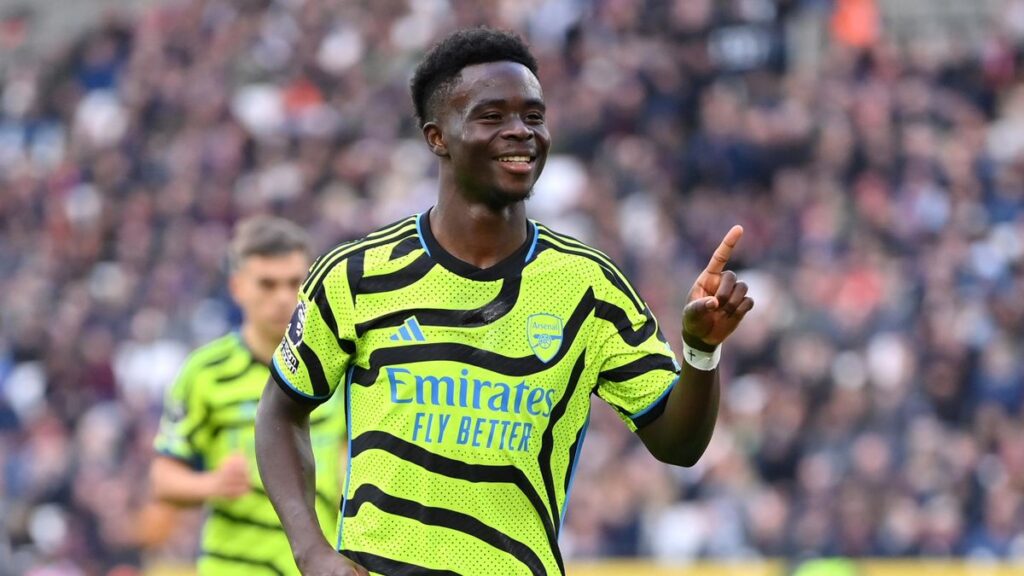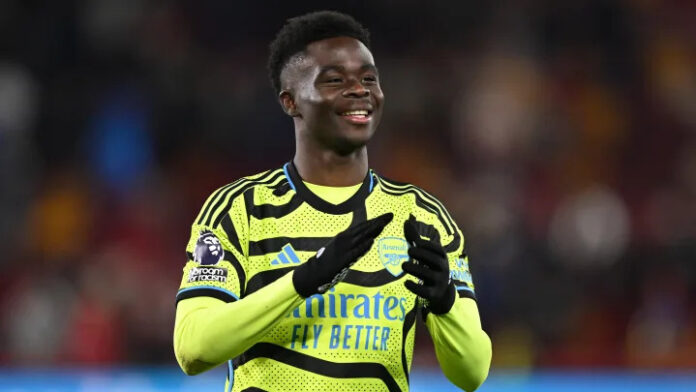Arsenal’s players didn’t celebrate much at the end here. But then, Mikel Arteta’s team could be excused feeling a little spooked by what was a genuinely strange afternoon, a haunted house of a Premier League game.
Somehow, they managed to go in at half-time 4-0 up, but still looking like a team that probably could do with a proper centre‑forward (it should, frankly, have been seven or eight). Either side of this the home crowd disappeared, came back, then vanished for good, leaving so much empty plastic in the stands the London Stadium might have been designated an environmental disaster zone by the UN.
By the end the enduring memory was Arsenal’s energy – still outsiders in the title race, but also buzzing here with heat, light and a tangible sense of hunger. By contrast West Ham’s role in this 6-0 home defeat can be dealt with quite quickly. Basically, they didn’t have one.
It will be tempting to describe West Ham’s performance as wretched, dreadful, slack, an abdication of professional responsibility, because it was all of these things. But this is also to dignify it with a shape and a recognisable set of flaws. This was instead something else, an absence, a West Ham-shaped hole.
There were shirts, colours, figures half-glimpsed at the edge of things, un-football un‑played in front of non‑crowd. At times you half-expected a group of agitated van drivers to come striding out and start dragging the West Ham players off the pitch in the mistaken belief this was some kind of protest against the expenditure of unnecessary energy, a first blow for the Just Stop Football movement.
It was a horrible spectacle for David Moyes, all the more so for a manager whose contract is up for renewal, who spent much of the game looking utterly stricken, rising from his dugout to stroll the touchline. Playing on the break, allowing an opponent to have the ball, all of this can be done with energy, menace, aggression.
On the other hand, you can do it like this, and West Ham’s non‑performance will receive its own extended autopsy this week. The happier story here was Arsenal’s energy and bite, a team that looks genuinely refreshed and recharged, for now, by that winter‑sun training break.

Pre-Dubai, Arsenal had lost three on the bounce and scored five goals in seven. Post-break, the record reads four straight wins and 16 goals scored. Bukayo Saka has four goals and an assist in those four games. He looks like Saka again, same movements, same twists and turns, but performed now with precision and bite and snap. Knowing what he’s about to do is one thing. Stopping it is another.
Arsenal were excellent again from set pieces, with Declan Rice’s deliveries setting up two goals, the first of the afternoon butted in by William Saliba. At which point the green-yellow shirts gathered by the corner flag to commune en masse, the day already starting to break open. And yes, it is also a good moment to talk about those celebrations, and about the temperature of this team, what it is they’re trying to do this season, two points off the top but outsiders still in the race. The celebrations are easily misunderstood, but they are also part of this.
In old-school terms, to celebrate is to show weakness, presumption, complacency. Emotion must be channelled. The fear of hysteria or “enthusiasms” lurks. In Victorian England there was a fashion for holding up something called an orange board while eating fruit in polite company, for fear the sight and sounds of overtly sensual juice‑devouring might cause society to crumble, the hierarchy to quiver. Perhaps Arsenal could introduce a celebration board for their players, to be passed around post-match, thereby containing any such shows of unmanly weakness.
In reality there is a logic here. Why do Arsenal celebrate with such intensity? A better question is: how does this side go about writing a narrative where it might actually win the league. Take a look at the two other teams in this race. Arsenal will need to finish ahead of Manchester City, who are in pursuit of greatness, who have a peerless cutting edge in Erling Haaland, and a shot now at ultimacy. Liverpool have their own narrative. Late-stage Jürgen Klopp energy, last things, home delirium. This also feels like a story, dots to be joined, plausible champion energy.
Why would Arsenal finish ahead of this? What is the story here, the tool they will use to derail these competing forces? The answer is energy, will, and youth. There are many wonderful functioning parts here, but other teams also have strengths and Arsenal are still just a little more callow.
So they need to make noise, to be disruptive, to be as relentless as they were against Liverpool, to be hungrier, wilder, more tightly bonded than you. This is the most obvious version of how they win a league now. It is also why Arsenal will celebrate, will seek to create their own internal story, to be wilder, more intense.
It’s a tactic, a vibe, an attempt to write a success narrative. It might feel a little gauche and forced at times, like Kendall Roy striding tie-less into the takeover room and shouting let’s start this party. It might come unstuck in the end. But here they replicated that same collective energy on the pitch, and reduced West Ham to a team playing a half‑remembered version of their own game.




